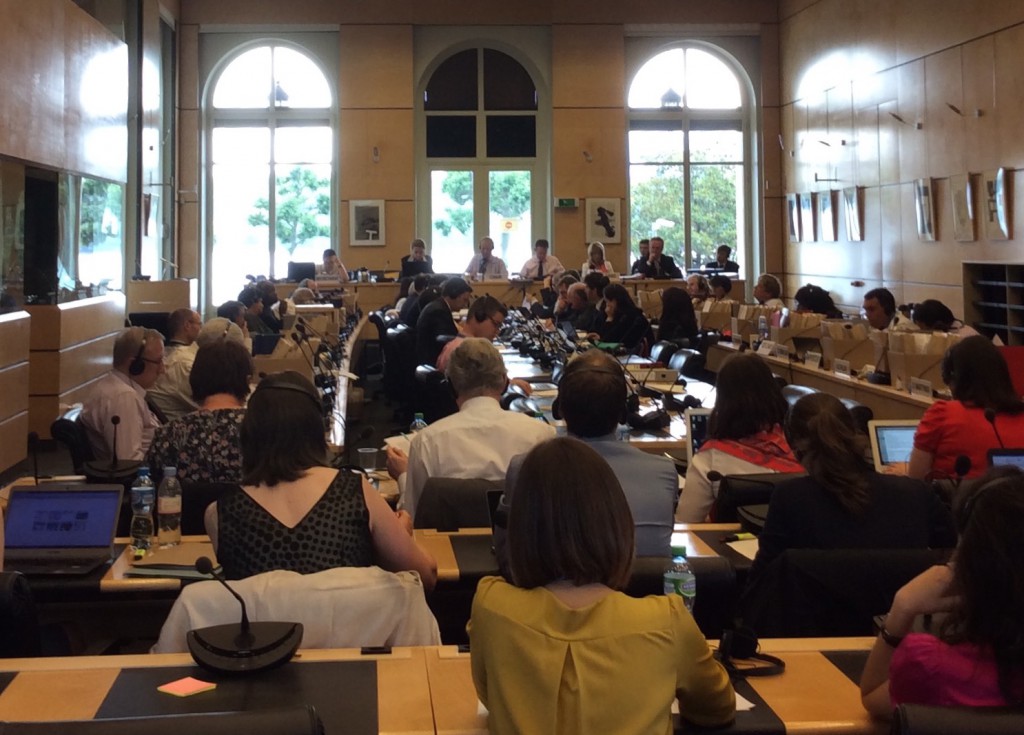 The chairs of both of the two major UN Human Rights Committees have now strongly criticised Ireland’s lack of separation of church and state, while reviewing Ireland’s human rights record at sessions in Geneva in which Atheist Ireland participated.
The chairs of both of the two major UN Human Rights Committees have now strongly criticised Ireland’s lack of separation of church and state, while reviewing Ireland’s human rights record at sessions in Geneva in which Atheist Ireland participated.
This week Waleed Sadi, chair of the ESC Rights Committee, compared Ireland to a developing country, saying that we are unique in Europe where separation of church and state is almost sacrosanct.
And last year Nigel Rodley, chair of the Human Rights Committee, linked many of our social problems to the institutional belief system that has predominated in and sought to dominate Ireland.
These are damning observations, now coming from the chairs of both of the Committees of independent experts that oversee the two major treaties that give legal effect to the Universal Declaration of Human Rights.
We in Ireland have grown up with religious discrimination that is so prevalent that it is almost invisible, and many of us do not appreciate how outrageous our system seems to independent outsiders who apply international human rights values to it.
Atheist Ireland
Atheist Ireland has taken part in both of these examinations, firstly by making written submissions to both committees, and secondly by attending in Geneva to brief the Committee formally and to personally lobby and inform the Committee members on the accuracy of Ireland’s responses.
This is an important part of our overall strategy, to gradually introduce international standards of human rights to the social, political and legal discourse in Ireland. We do this work alongside other civil society groups with their own specific focuses within this shared aim.
Too many people do not realise the fundamental significance of freedom of thought, conscience, religion or belief, freedom from discrimination, equality before the law, the rights of the child, the right to private and family life, the right to education and health, the right to participate in civil, political, economic, social and cultural life, and the right to an effective remedy.
It is important to remember that these are not lofty aspirations. They are the minimum standards of protection that we should automatically expect in a democratic society.
Atheist Ireland has also made submissions to two other UN Committees that have examined Ireland, the Committee on the Rights of the Child, and the Committee to Eliminate all forms of Racial Discrimination, as well as briefing the EU, the Council of Europe and the OSCE on Irelands human rights record.
Following this week’s questioning by the Committee on ESC Rights, we are awaiting the concluding observations of the Committee. We hope that the outcome will be similar to last year, when the Committee on Human Rights told Ireland to stop breaching the human rights of atheists and minority faiths in the education system, employment, religious oaths and blasphemy law.
Background
The two major UN treaties that give legal force to the Universal Declaration of Human Rights (UDHR) are the International Covenants on Civil and Political Rights (CPR) and on Economic Social and Cultural Rights (ESCR).
These Covenants are overseen by Committees of independent human rights experts, who question each State Party on a rolling basis, and make recommendations for changes needed to bring the State’s practices into line with its obligations under the Covenant.
This week, when the UN Committee on Economic Social and Cultural Rights questioned Ireland, the chairperson Waleed Sadi said:
“In a developing country this would not be unusual but by European standards it is almost sacrosanct, this division between Church and state. Your country, Ireland, poses a unique situation. Is it a uni-cultural or multi-cultural society? It seems to me to be more a uni-cultural society. If so what happens to minorities in your country?”
Last year, when the UN Committee on Civil and Political Rights questioned Ireland, the chairperson Nigel Rodley said:
“The Magdalene laundries, the Mother and Baby homes, the child abuse, the symphysiotomy. It is quite a collection, and it is a collection that has carried on beyond any period that it is hard to imagine any State Party tolerating. And I can’t prevent myself from observing that all of them are not disconnected from the institutional belief system that has predominated in the State Party, and which occasionally has sought to dominate the State Party.”
Thank you Michael and Jane for representing us in Geneva in such an honest, robust and truthful manner. Do you remember the old Smithwicks ad, one of the lines in it, “the Irish can’t handle the Truth”,
It is so good to know that these UN chairs can see so clearly what is going on. It is thanks to people like yourself that the Irish government obfuscations are being sliced open.
Bravo. AI continues to impress.